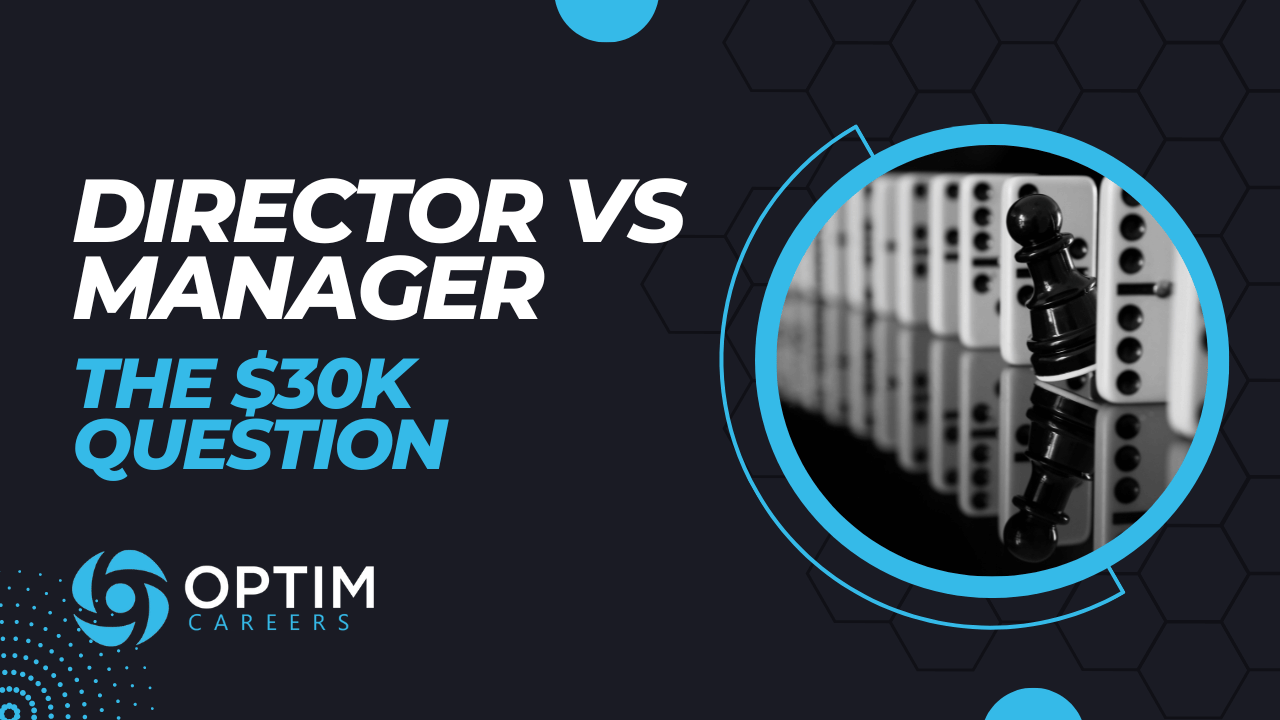Director vs Manager [Knowing the Difference Could Save You $30K]
The difference between a director and a manager seems obvious on the surface, but could you actually articulate it in detail? If not, that’s a problem, whether you’re looking for a job or hiring for a role at these levels.
The easy answer would be a manager manages people and processes, while a director directs them. But it’s not as intuitive as many people think. And a lot of organizations (I know because I’ve worked with them) don’t have a standardized way to determine the difference. Today, I’m going to give you one that works.
Understanding this difference will help you:
Find the right jobs that fit your qualifications and desires;
Attract and find the right candidates for your director and manager openings;
Compensate or be compensated for the appropriate work and not the title;
Plan your career path if you’re aiming for one of these two job levels;
Write better resumes and interview better for these jobs; and
Ask better questions to candidates to determine their qualifications and readiness for your job.
What Is A Manager
Let’s start with the manager. The best, simplified working definition I’ve heard is from Bill Todd, who is a former C-Suite executive. Bill says managers do four things.
They plan what actions they and their team must take to achieve their goals.
They organize. They allocate resources, create teams, assign responsibilities, and budget.
They influence their team members to produce the desired behaviors that lead to success.
They control the ship and redirect it when it deviates from the plan.
Types of Managers
Of course, the conversation is more nuanced than that because there are different types of managers.
There are entry-level managers who usually have the title of team leader or supervisor. These are people who provide direct supervision and oversight of the day-to-day functions of a group of individuals. These are front-line managers. They’re concerned with daily operations.
Then there are front-line managers who also do the same job as those supervisors but on a larger scale. A supervisor may oversee a group of people on the team, and the front-line manager may oversee several of those groups or an entire department. Some companies don’t even have supervisors so the manager does it all. I’ll get into more specifics on job duties in a minute.
Then there are second-line managers, or senior managers, who are mostly focused on developing team leaders and individuals as well as reporting on metrics. In many cases, there is one manager who does all of this, but as a company scales you may see a separation that looks like this.
Manager Responsibilities
In general, most managers hold the following job responsibilities.
They oversee a team of employees within a department or the entire department if the company is smaller.
They manage staff and oversee their work product.
They recruit, train, and develop teams.
They ensure compliance with company policies, legal requirements, and safety protocols.
They conduct performance reviews and evaluate their team members’ eligibility for raises and bonuses.
They coach, mentor, and discipline employees.
They work with their team members to set individual performance goals and expectations.
They report on their team’s KPIs (key performance indicators) to upper management and relay feedback that influences strategy.
They authorize PTO and oversee scheduling.
What Is a Director
A director is not simply someone who manages the managers, although that is part of their job. A director isn’t an upper level manager at all. A director is the lowest level of executive in the company. Think of it as an entry-level executive.
A company director could also refer to someone who sits on the board of directors, but that’s not really what we’re talking about in this article. Those types of directors either represent the shareholders in larger organizations or they are the shareholders.
Director Responsibilities
Typically, directors hold the following job responsibilities.
They are responsible for strategy execution within the departments that they oversee. They write policy and procedures.
They may oversee managers and develop them similarly to how managers oversee individual contributors.
They usually have several indirect reports and may oversee several functions within a department.
They develop business strategies and implementation methods for that strategy.
They may occasionally report or present information to board members.
They oversee manager performance reviews.
They are heavily involved in business analytics and prepare business plans, budgets, and forecasts.
They evaluate department needs and resources and make plans based on these needs.
Oversee department-wide performance and efficiency, usually consolidating reports from managers.
What is the Difference Between a Manager and a Director
Reporting Structure
This may seem straightforward, but it’s worth mentioning. Managers supervise entry-level and mid-level employees who are typically direct reports to that manager. Directors usually have more indirect reports than direct reports. Directors supervise managers who usually have several years of experience already. The caliber required to develop these individuals is much greater.
If this were a schoolyard, managers would be the kindergarten teachers (it’s easier to develop and coach kindergarteners) and directors would be high-school teachers (you’ve got to have a bit more knowledge and know-how to teach high schoolers).
Strategy vs Execution
Managers execute the strategy given to them and provide feedback that influences changes. Directors establish the processes, best practices, and overall strategy based on business analytics and feedback from managers.
In other words, directors determine how work gets done, managers determine what work gets done.
Scope
I touched on this earlier, but I want to expand. Managers focus on aligning the goals of individual team members with the department’s goals. They focus on what each individual needs to meet their goals, whether that be coaching or resources.
Directors examine the big picture and focus on the overall department goals. If one manager’s numbers are down for the month but everyone else’s are up, the director is still doing a good job. Although they may determine that a strategy change should be made, including dismantling the underperforming team due to market conditions or replacing the manager if it’s a leadership issue. Again, they set the strategy.
Decision-Making Autonomy
In many organizations, managers follow the processes outlined by directors. Directors have much more autonomy to make decisions compared to managers. Managers usually provide feedback on the tools they think their team needs or how many new hires they think they need to meet demand. But it is the director that usually makes the decision on these things. The director is the one who evaluates software, forecasts headcount, and ultimately determines if process and policy are working.
Personal Liability
While there are some cases where managers can be held personally liable, directors have much more liability exposure as executives of the company. Directors can often hold personal liability for employment violations, breaches of fiduciary responsibility, taxes (if that’s your domain), and other items.
Make sure you’re ok with that level of responsibility before stepping into one of these roles.
Meetings
Managers spend most of their days answering phone calls, responding to emails, reviewing metrics, and working 1:1 with team members. Directors spend much of their time in meetings with executives and managers. Their primary focus is frequently on researching new strategies and solutions and then communicating any change management.
Past vs Future
Directors are often looking at the future forecast. Their job is to establish the plan and strategy to reach a future goal. The number and data they work with are much different than those that managers review. Directors are not only concerned with the short-term but also the long term planning of the organization.
Managers, on the other hand, usually report on the past. When a manager reports numbers, those numbers are finalized and can’t be changed. This isn’t universal and varies depending on the department you oversee, but most of the time this is the case.
Salary
Managers, on average, earn around $80,000 per year; however, it could be much lower. True director-level roles often pay closer to $150,000. Again, there are a lot of factors that come into play here such as industry, department, and size and scope of the actual role, but these are good averages.
I’m telling you this because I don’t want you to assume because the title says director, you’re going to make $150,000. You have to look at the job description and evaluate how it fits within the items I’ve shared with you. If it’s manager responsibilities with a director title, you can expect to be paid manager pay, not director pay.
Do Companies Use a Standardized Definition of Manager and Director
No. I’ve worked with hundreds of companies over the years as a recruiter and consultant. It’s probably close to a thousand at this point. And I’ll be the first to tell you, that companies are all over the place with these titles. That’s why it’s important for job seekers to read the job description and evaluate for yourself if you’re applying for a manager or director-level role. Just because it has the title, doesn’t mean it’s the job you would expect.
Companies can benefit greatly by standardizing their definitions of manager-level and director-level. They don’t have to be exactly as I’ve laid them out above, but they should be similar. I can’t tell you how much money I’ve made (well, I could, but I won’t) from companies to recruit talent that they couldn’t find on their own. In many cases, it was because the title didn’t match the responsibilities. When I changed the title on my job ads, I had plenty of qualified candidates to present.
Sadly, those companies paid $20,000 to $30,000 for each hire simply for me to assess a titling error and post a job ad where the title and scope aligned. Follow what I outlined above and you’ll save yourself a lot of money - money that hopefully you can pocket in your next bonus.
How to Move From Manager to Director
While there seems to be a growing trend that many people don’t aspire to become managers or directors, there are still some of you out there with dreams about advancing. I’m not going to make the case for whether you should or not in this article, but I’ll leave you with a couple of quick tips that helped me and others reach the director level.
First, get involved with cross-functional teams and projects. The more departments you become familiar with and start understanding their work the better. This will also develop your leadership skills.
Second, start contributing to strategy development. Take the initiative to review your own team’s analytics and dive into them. Look for trends and make recommendations about how to improve. Get really good at making business cases.
Lastly, I would invest in an executive coach. You’d be surprised how many high-powered executives today hired a coach to get them there. I highly recommend meeting with Susan Collins to see if coaching is right for you. She knows her stuff and has shaped some of the best executives out there. Tell her Cole from Optim Careers sent you.
Director Vs Manager Recommended Reading
First-Time Supervisor Interview Questions
Cole Sperry has been a recruiter and resume writer since 2015, working with tens of thousands of job seekers, and hundreds of employers. Today Cole runs a botique advisory firm consulting with dozens of recruiting firms and is the Managing Editor at OptimCareers.com.










